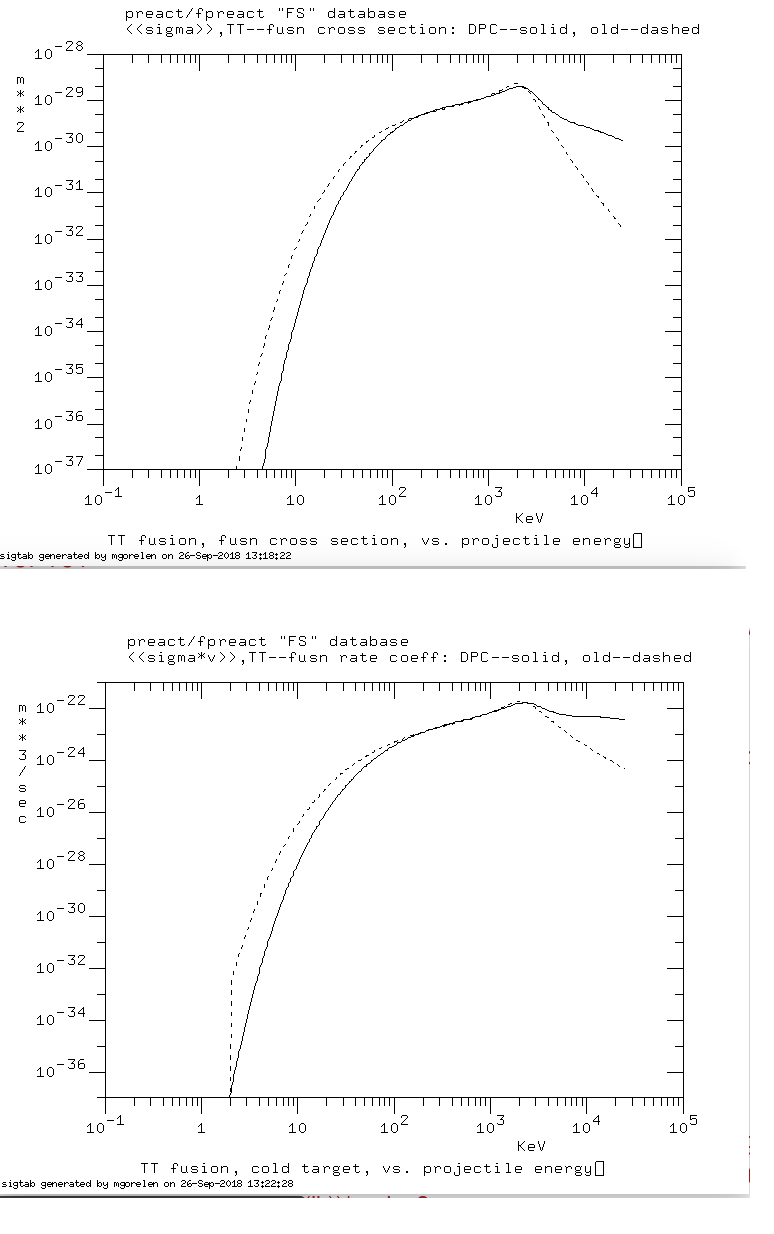TRANSP can follow the fusion products using the NUBEAM MonteCarlo.

- NPTCLF
- Number of particles to be tracked in the MonteCarlo code. The default is 1000
- NLFST
- Set equal to TRUE to calculate products from D(D,T)p reactions [Eq.1].
- NLFSP
- Set equal to TRUE to follow protons from D(D,T)p reactions [Eq.1].
- NLFHE3
- Set equal to TRUE to calculate products from D(D,He3)n reactions [Eq.2].
- NLFHE4
- Set equal to TRUE to calculate alpha products from D(T,He4)n reactions {Eq.3}.
- NLFATOM
- Set equal to TRUE to compute atomic physics effects on fusion products fast ions slowing down.
The T(T,He4)2n reactions [Eq.4], as a by-product of D(D,T)p reactions, are also calculated in TRANSP.
New fitting for T-T reactivities
With version 18.2 new fittings over DPC have been implemented for T(T,2n)4He fusion reactions, based on the work by David Coster [IPP, Garching].
The input data are available on the SVN repository
https://gforge6.eufus.eu/svn/amnsproto/curation/nuclear [password-protected page]. Please check for Revision 642.
Set:
- LEV_TTNUK = 1
- To use the new fittings by David Coster. The figure below shows a comparison between the old fitting in TRANSP and the new fit by D. Coster.

Power threshold
It is possible to set a power threshold above which the number of particles NPTCLF in the MonteCarlo calculations is maintained. If the actual source power is lower than the set power threshold, then a population of f*NPTCLF MonteCarlo particles is maintained, where f=[actual source power]/threshold power. The default values for the various fusion reactions are as follow:
- PLFST [=100.0 W]
- power threshold for D(D,T)p reactions
- PLFSP [=100.0 W]
- power threshold for D(D,T)p reactions
- PLFHE3 [=100.0 W]
- power threshold for D(D,He3)n reactions
- PLFHE4 [=10.0 kW]
- power threshold for D(T,He4)n reactions
Model Options for alphas
- NALPHA=0
- This is the default value, to calculate the alphas from the MonteCarlo model.
- NALPHA=1
- Fast, non-Monte Carlo model by D. Mikkelsen. This model has no orbit effects and assumes instant equilibration of the alpha slowing down distribution on the background plasma.
Renormalisation
It is possible to use 1D input Ufile data for the total production rates of the various fast ion populations as a function of time to renormalise the profiles determined from simulation. This is done using the following switches:
- NLUSFA
- Set this flag to
TRUEto read in He4 data from UFILESPRESFA/EXTSFA. - NLUSF3
- Set this flag to
TRUEto read in He3 data from UFILESPRESF3/EXTSF3. - NLUSFT
- Set this flag to
TRUEto read in He3 data from UFILESPRESFT/EXTSFT. - NLUSFP
- Set this flag to
TRUEto read in He3 data from UFILESPRESFP/EXTSFP.